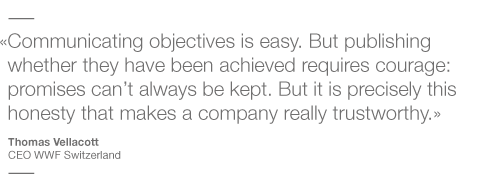
Responsible actions are the top priority
Migros takes responsibility along the entire value-added chain and endeavours to find optimal economic, social and ecological solutions in all its activities. In 2012 the company refined its sustainability strategy and launched the Generation M sustainability programme.
Migros is dedicated to socially sustainable growth for the benefit of all. As a cooperative, it is not obliged to serve the interests of investors; instead, it has a long tradition of involvement in social and community issues. For example, it created Migros Culture Percentage more than 55 years ago and began saving energy as far back as the early 1970s. The principle of sustainability is part of the Migros culture and constitutes the foundation of the company mission (in german) and group strategy. In 2012 the company included the additional value «sense of responsibility» in the strategy and focused its approach to sustainability on five spheres of activity. As a member of the Global Compact, Migros has also been committed to working towards international principles of human rights, labour law and environmental protection as well as fighting corruption, and supporting these within its area of influence since 1996.
Sustainability in practice
The top responsibility for sustainable growth is borne by the Board of Directors of the Federation of Migros Cooperatives. Specialist departments and line managers in all companies of the group oversee the implementation of social and ecological concerns. In 2012 Migros upgraded the existing Issue Management office to the Issue Management & Sustainability department. The reclassification is a clear demonstration that sustainability is strategically managed and must be represented at the highest corporate level. The issue and stakeholder forum was dissolved as part of the reorganisation.
The Issue Management & Sustainability department is the central platform for the sustainability policy of the entire Migros Group and reports directly to the FMC's Chief Executive Officer. Migros has a management system in place to control and monitor its sustainability performance. On the basis of key performance indicators (KPIs), not only business, but also social and environment-related company achievements, such as the level of fulfilment of the BSCI Code of Conduct and CO2 emissions, can be controlled.
In 2012 Migros also launched the sustainability programme Generation M, which pursues specific sustainability objectives in the five spheres of activity consumption, environment, employees, society and health. Twice a year, Migros checks whether it is meeting these objectives and communicates the results on its website. The current progress report can be found here.

Sustainability at Migros
Since 2011, a range of basic social and ecological requirements have applied for all Migros Group companies, which ensure that all products on Migros shelves have been produced with respect for people, animals and the environment. In addition to the ten regional Cooperatives and the FMC, which form the core business, the same directives are being implemented gradually in all retail and industry companies. The directives contain, for instance, the BSCI Code of Conduct, covering aspects on food safety and on animal welfare, as well as on the protection of global fisheries and rainforests. In 2011 Migros decided to gradually incorporate all Migros Group companies into the energy and environmental management.
Responsible consumption
Migros takes its responsibility at the point of contact between supply and demand seriously. It offers a wide range of environmentally and socially acceptable products and services, while providing comprehensive information for customers to make informed choices when shopping. In addition to stocking a broad selection of label products that offer particular environmental or social added value, Migros maintains high standards to ensure that all goods on its shelves are produced with respect for people, animals and the environment. It also promotes a healthy lifestyle, such as with its sports and exercise programmes, as well as with products and Migros Club School courses that contribute towards a balanced diet.
Exemplary corporate environmental protection
Migros operates a comprehensive energy and environmental management system. This incorporates all stores, logistics centres and Migros industrial enterprises, the retailers Globus, Interio, Denner and Migrol as well as Migros Bank and the tour operator Hotelplan with the most important key performance indicators. The Cooperatives Migros Lucerne and Migros Valais (since 2012) as well as the industrial enterprises Chocolat Frey AG, Aproz SA and Scana AG are also ISO 14001 certified.
Migros has binding targets in all important areas of environmental protection – for example, in relation to energy consumption, CO2 emissions, water consumption, the use of refrigerants and waste. Every year, Migros carries out an audit to ensure that the companies are on track and implements corrections where applicable. The 2020 climate and energy strategy came into force in 2012. The new targets for Cooperative Retailing are: reduce greenhouse gases by 20% and power consumption by 10% before 2020 (in relation to 2010). In the reporting year, Migros also defined a climate and energy strategy for its industrial enterprises, the objectives of which were further substantiated by the individual enterprises.
Society
People are the focus of Migros' varied commitments. It makes an active commitment to society and culture; for instance, it gives more than CHF 115 million annually to Migros Culture Percentage and supports development projects conducted by the Aid Fund. Migros is in a permanent dialogue with numerous stakeholders. The forms of dialogue are manifold and range from occasional, informal meetings to membership through to closer cooperation. In its communications with customers, Migros is focusing increasingly on the Internet and social media. Migros also conducts a series of customer surveys and every three years a representative survey on Migros' reputation amongst stakeholders.